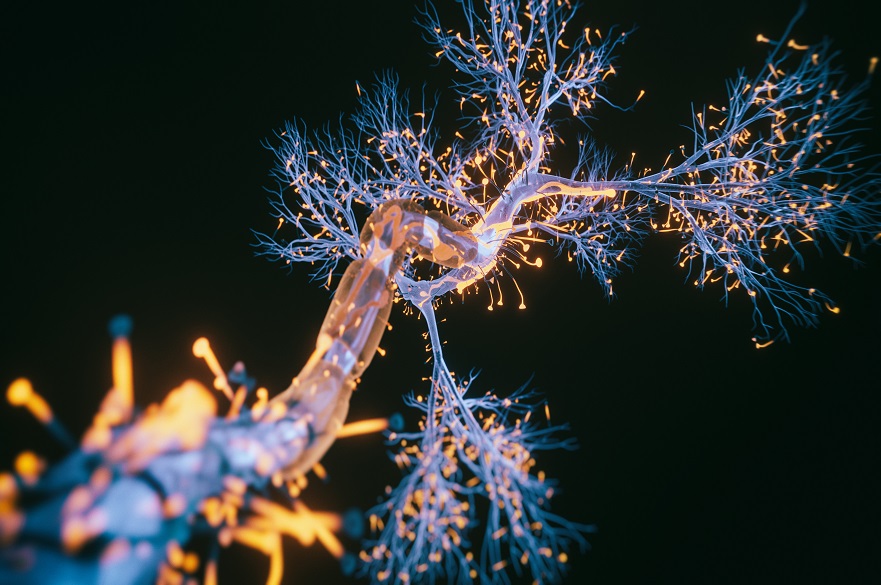Microscopic ‘nano-shuttles’ may help drive degeneration of brain cells, research suggests
Tiny ‘nano-shuttles’ transport a damaging cargo around the brain where it goes on to play a role in the degeneration of cells, a study has suggested.
By Dave Rogers | Published on 3 October 2022
Categories: Press office; Research; School of Science and Technology;

Scientists at Nottingham Trent University and the National Research Council Institute of Neuroscience in Milan have established how these micro vesicles ship the enzyme ‘transglutaminase 2’ (TG2) from one cell type to another.
TG2 is abundant in many cells and, while it can have a protective role, has been associated with various human diseases, including neurodegenerative diseases such as dementia.
The researchers have now revealed a mechanism through which this might occur, reporting for the first time how TG2 is shuttled from astrocytes, the most numerous cell type in the central nervous system, to neurons in the brain.
Their study suggests that the process may happen normally as the brain adapts to new information, but that it increases in disease as astrocytes – which are central to the brain’s immune response – are stimulated.
The team found that TG2 is responsible for driving a small influx of calcium ion to neurons, a careful balance of which is known to be crucial to their survival and ability to communicate.
Even tiny increases in calcium ion can create dysregulation of neurons, which can lead to neurodegeneration and dementia.
The actual mechanism through which this calcium ion alteration occurs has also been proposed, with the researchers suggesting it is due to a shift in electric charge distribution, resulting in less negative charge inside the neuron compared to the outside.
During the study, carried out in animal cells, the team also found that the increase in calcium ion was reversible through TG2 removal.
The team hopes that future work could look at the effect in patients with neurodegenerative conditions.
It is hoped that better understanding of the biological process leading to the damage of cells in the brain could be used to help control the further spread of disease.
“We have shown for the first time that TG2 travels to neurons and contributes to changing the level of calcium in neurons, a process that has been linked with neurodegeneration,” said lead scientist Dr Elisabetta Verderio Edwards, an associate professor in Nottingham Trent University’s School of Science and Technology.
She said: “The balance of calcium ion is a fundamental biological process in neurons and small changes can build up over time and create dysregulation in the cells.
“Astrocytes secrete these tiny extracellular vesicles which act as microscopic shuttles – about 100 nanometres in diameter – to transport their cargo of TG2 between the cells.”
First author Elisa Tonoli, a research fellow at Nottingham Trent University, said: “Previous studies have shown that astrocytes undergo early changes in Alzheimer’s Disease, however the cross-talk between astrocytes-neurons via extracellular vesicles has been less understood.
“We have now identified a new pathway initiated by astrocytes, which as well as being part of an essential physiological function under inflammatory conditions could lead to degeneration of brain cells.”
Nottingham Trent University researchers previously reported how TG2 also played a key role in the onset of kidney disease.
The latest study, which also involved the University of Milan, University of Milano-Bicocca and the University of Bologna, is reported in the journal Progress in Neurobiology
Notes for Editors
Press enquiries please contact Dave Rogers, Public Relations Manager, on telephone +44 (0)115 848 8782, or via email.
Nottingham Trent University (NTU) received the Queens Anniversary Prize for Higher and Further Education in 2021 for cultural heritage science research. It is the second time that NTU has been bestowed the honour of receiving a Queen’s Anniversary Prize for its research, the first being in 2015 for leading-edge research on the safety and security of global citizens.
NTU was awarded Modern University of the Year 2023 (The Times and Sunday Times), Outstanding Support for Students 2020 (Times Higher Education Awards). It was the University of the Year 2019 (Guardian University Awards, UK Social Mobility Awards), Modern University of the Year 2018 (Times and Sunday Times Good University Guide) and University of the Year 2017 (Times Higher Education Awards).
NTU is the 5th largest UK institution by student numbers, with over 33,000 students and more than 4,000 staff located across five campuses. It has an international student population of 4,000 and an NTU community representing around 160 countries.
In the past 15 years, NTU has invested £450 million in tools, technology and facilities.
NTU is in the UK’s top 10 for number of applications and ranked first for accepted offers (2019 UCAS UG acceptance data) It is also among the UK’s top five recruiters of students from disadvantaged backgrounds.
75% of NTU students go on to graduate-level employment or graduate-entry education / training within fifteen months of graduating (Guardian University Guide 2021).
NTU is 4th globally (and 3rd in the UK) for sustainability in the 2021 UI Green Metric University World Rankings (out of more than 900 participating universities).